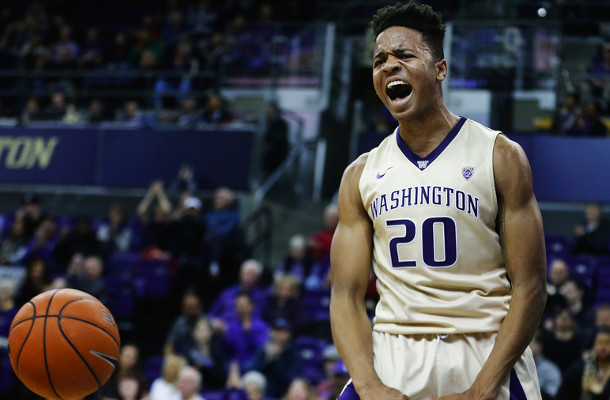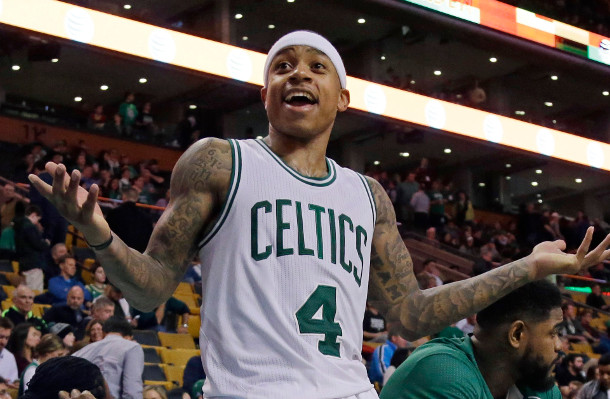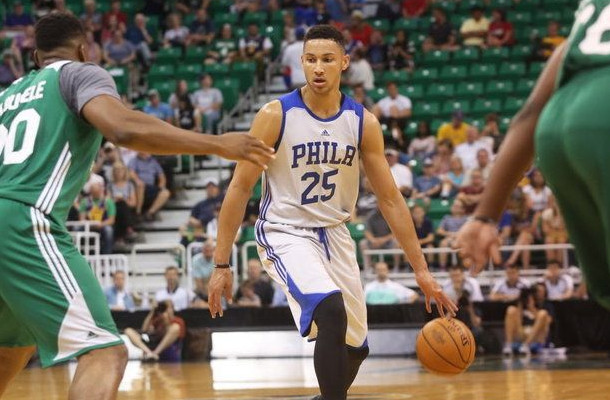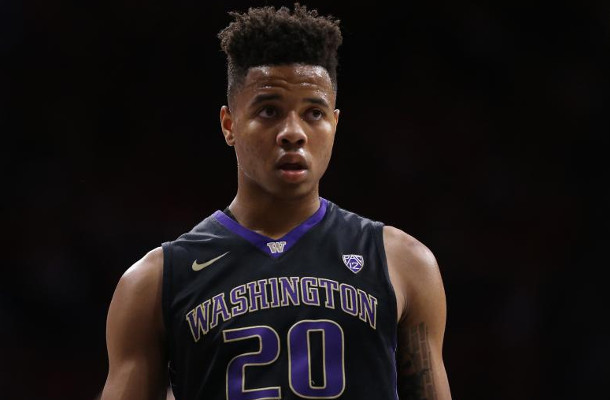Dario Saric’s Contract Situation
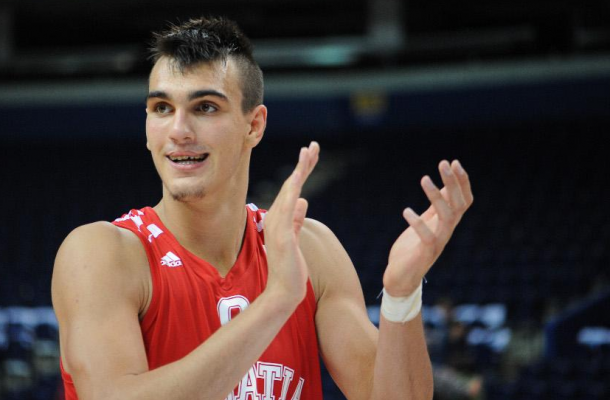
Just days before the 2014 NBA Draft, Chad Ford reported that Dario Saric had signed a three-year contract with Turkish club Anadolu Efes, where he will join former NBA players such as Zoran Planinic and Nenad Krstic.
The contract, while for a total of three years, includes an out after two years (frequently cited as a “2+1” contract), should Saric wish to come over to the NBA then. Saric did say (in very broken English) at both Media Day and on Draft night that he would come over after 2 seasons.
“I will come to the NBA for sure, 100 percent in two years and that’s all.” — Dario Saric
Still, there is a little-known rule regarding draftees that could give Saric a little bit of leverage, and Sixers fans a little bit of concern. Actually, there are two rules.
First, just as a refresher: 1st round draft picks are governed by a rookie scale. The NBA sets an amount for the contract based on the year they and position that players are drafted, and then rookies and teams can negotiate 20% up or down from there. In practice, virtually all rookies get 120% of that rookie scale. For the 12th pick in the draft, this would slot in at ~$1.8-$1.9 million for his rookie season, meaning Saric should earn ~$2.2 – $2.3 million his first year in the league.
Saric does have a way to get around the rookie scale, though: by staying in Europe for 3 years.
According to Article VIII Section 2 of the CBA, if a first round draft pick does not sign with the team that holds his draft rights within 3 years following the draft that he was selected in, he can negotiate a contract (of 3+ years in length) greater than 120% of the rookie scale contract, presuming the team that holds his rights has the cap space to do so.
A key note: he would only be able to negotiate with the team holding his draft rights (aka, the Sixers, assuming that they don’t trade his rights, of course).
Because Saric would only be able to negotiate with the Sixers, the amount of actual leverage that he would gain is questionable. He would also have to sacrifice a year of his NBA salary to do so. Saric’s contract with Efes is worth a reported 2 million euros total over three seasons, or about $2.6 million, which would come out to $866k per year.
So, would it make finanial sense for Saric to try to avoid being bound by the rookie-scale?
(Disclaimer: There’s no real solid, publicly available source for Euroleague contracts, and the exact per-year figures are often disputed and inconsistent. The calculations in this article will be based on the reported contract described above, as reported by EuroHoops.net. I did reach out to Saric’s agent, who declined to comment on the details of his contract, and to this point I have not been able to get these figures confirmed. These numbers should be taken with a grain of salt, and are really just here as a demonstration to detail out all the aspects a European player coming to the NBA has to take into consideration. If I can get the exact per-year amount confirmed, I will report it as such.)
First, his Efes contract is a “net income” salary, meaning it’s what Saric gets after taxes. So he would have to earn more than the roughly $866k conversion rate to US dollars in order to earn more from his Sixers contract. At a 40% federal income tax, this is roughly the equivalent of a $1.5 million Sixers contract. From that perspective, the $2.2 million or so rookie-scale contract still makes financial sense.
However, Saric also has a buy-out after two years worth a reported $800k (US dollars). The Sixers can pay a portion of this, up to what is called the “Excluded International Player Payment Amount”. For the 2016-17 NBA season this amount is set to $650k. The remaining $150k essentially has to come out of the players salary: either coming right out of his post-tax salary, or as a signing bonus where Saric would get paid less than the 120% rookie-scale, but which the Sixers could use the difference between 120% of the rookie scale and Saric’s actual salary as essentially a signing bonus, and spread the cap hit out over 4 years. Usually, the signing-bonus method is done when there is a large difference between the Excluded International Player Payment Amount and the buyout, so in this instance, it would likely come out of Saric’s post-tax salary.
Still, even with the Sixers contract being pre-tax (vs post-tax for Efes), and even with the buyout, Saric’s 2016-17 earning potential is maximized by taking the Sixers rookie-scale contract. But, in theory, the difference may not be huge, and if Saric (and his team of advisors) feels they can make up the difference in 2017-18 and 2018-19 by not being bound by the rookie-scale contract, they may believe that it would make financial sense to stay in Efes for 3 seasons and come over for the 2017-18 season.
That being said, with Saric only being able to negotiate with the Sixers even if he lets his entire Efes contract run its course, I’m dubious about how much actual leverage they’d gain. If there’s even the slightest bit of truth to Saric’s claim that he wants to compete in the NBA after 2 seasons, there’s not a whole lot of financial incentive, from my perspective, to be gained by dodging the rookie-scale.
The scarier (and even less likely) situation comes if Saric decides he wants to avoid the Sixers entirely.
According to Article VIII Section 5 of the CBA, if a player has a previously existing contract that overlaps with any of the NBA season, or if he signs a contract with a non-NBA team, the Sixers retain Saric’s exclusive rights. The contract Saric signed with Efes falls into this category.
However, according to the same section of the CBA, the teams exclusive rights ends 1 year after the player is no longer under contract with a non-NBA team.
In short, if Saric lets his 3 year Efes contract play out, then does not play professionally for a year, he could become a rookie free agent. If Saric finishes he Efes contract, but then signs another contract outside of the NBA, the Sixers retain his rights.
Now, the fact that Saric would not only have to give up his rookie-scale earning potential in 2016-17, but also earn no money playing professionally in 2017-18, means that in order to avoid playing for the Sixers entirely, Saric would have to make a huge financial sacrifice, and wouldn’t be able to come over to the NBA until he’s 24. Losing ~$500k in earning potential in 2016-17, and ~$2.5 million in earning potential in 2017-18 would be a tough pill for Saric (and his agent) to swallow.
And it really doesn’t make much sense for Saric to avoid the Sixers. Yes, the Sixers recently drafted Joel Embiid and Nerlens Noel, seemingly created a log-jam in the front court. However, the combination of Embiid and Noel’s youth and inexperience, Noel’s ability to play both power forward and center, the Sixers lack of front court depth beyond that, and with the Sixers lacking the creativity and ability to create on the offensive end that Saric provides, and the Sixers are likely one of Saric’s best chances to get playing time and prove himself early on in his career.
The leverage Saric will get by waiting an extra year to avoid the rookie-scale is minimal, and the financial risk Saric will take to sit out a season to avoid the Sixers is huge, and neither look to help his position for negotiating his second contract.
And, if Saric is the competitor that he claims to be, and succeeding in the NBA is a priority as he says it is, that opportunity to play in the NBA would be a tough one to delay an additional 2 years.
In short: Yes, Saric can stay in Europe for a 3rd year to avoid the rookie-scale contract. And yes, Saric could, in theory, not play professionally for a year after his Efes contract expires, and thus avoid being bound to the Sixers. But both maneuvers would likely cost him more than they would be worth, and not something I’m spending too much time worrying about.
Related Posts
-
ojr107
-
ojr107
-
Howard Goldstein


